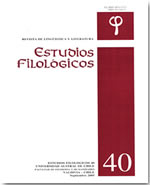Verbal tenses as evidence markers. The case of the Present Perfect Tense
Main Article Content
Abstract
Although it is widely recognized that people in everyday situations use tense morphemes "atypically" (for example present tense to describe events which are clearly in the past or past tense used to describe present or future events), most researchers insist on the idea that the main task of tense morphology is to encode temporality. In this paper we argue against this received theory of tense and propose instead an interpretation of tense morphemes as evidentiality/modality markers. Moreover, an analysis of the River Plate Spanish Present Perfect Tense is proposed that relies on this interpretation. All meanings attributed to the Present Perfect Tense in the literature (resultative, iterative, mirative, grade of commitment, formality) are explained as extensions of the core evidential meaning, namely, "according to available evidence, I conclude/state X".

